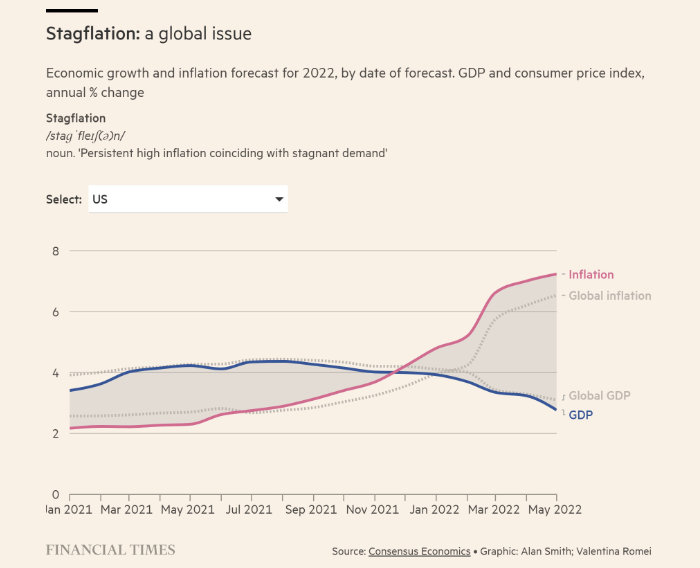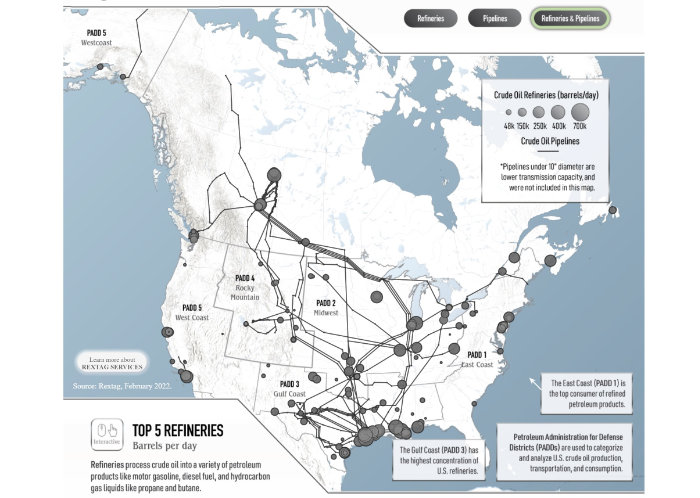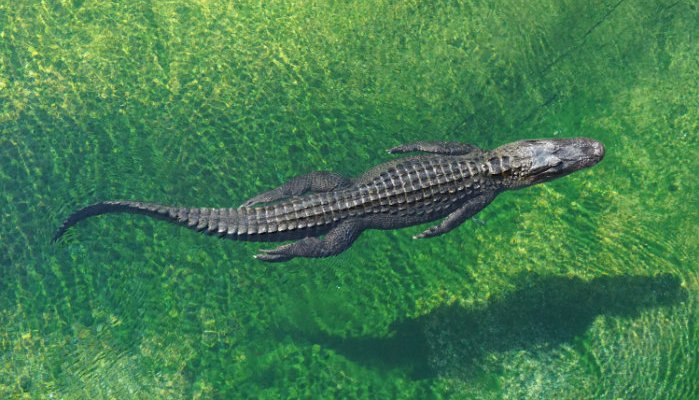(Editor’s note: I always end up with too many links I could ever possibly fit into a roundup. If you want an extra fix, I’ll post a small selection of extra links on Twitter and Discord every Tue and Fri morning, just after the roundup has been promoted on social. If you want an invitation to Discord please say so in the comments.)
In short
- As the Great Salt Lake dries up, it will release arsenic into the air
- USDA will provide $300M to support farmers’ transition to organic agriculture and $75M to support urban farming
- The EU will ban the sale of fossil-fuel cars by 2035
Economy, food, energy, and supply chain
World Bank slashed its global growth forecast for 2022 by 1.2 percentage points to 2.9% and warns of stagflation. The World Bank lowered its projection for the US to 2.5%. 2023 and 2024 won’t be much better. The US so far is keeping unemployment figures low, but inflation is expected to remain high.
Here’s a global inflation tracker:

Ukraine accused Russia of stealing 600,000 tonnes of grain for sale to the Middle East, but no official sale agreement has been reached. According to the UN, the grain blockade will cause hundreds of millions of people in developing countries to be at risk of “hunger and destitution”:
A Russia-aligned official in Zaporizhzhia claims that Russia is smuggling stolen Ukrainian wheat for sale in the Middle East
Turkey is the main destination of stolen Ukrainian wheat. This undercuts Turkey's image of impartiality in the grain export standoff
— Samuel Ramani (@SamRamani2) June 8, 2022
USDA announced a framework to transform the food system to benefit consumers, producers, and rural communities while reducing carbon pollution. It will also provide $300M to support farmers’ transition to organic agriculture and $75M to support urban farming.
Gas prices rise another 6 cents a gallon amid rising demand. According to analysts, a shortage of refinery capacity is the result of bad weather, Covid, and Russian aggression in Ukraine. Let’s not forget that any major storm in the Gulf of Mexico could further affect refineries, increasing prices. Below is an (interactive) map of pipelines and refineries in the US and Canada. The Gulf Coast has the highest concentration of US refineries:

Canada gas prices are at record highs, too. Here’s how much it costs to fill up five different car models.
Goldman Sachs predicts higher prices for oil and even higher markups for consumers. In the meantime, 21 oil and gas companies made over $41 billion in profits in the first three months of the year, more than doubling profits from just a year ago.
If you’re planning to store gas to beat inflation, make sure you know how to safely store gas at home, and what are the best gas cans.
Two opinion pieces: Rising costs signal the ‘long emergency’ we face after glutting on cheap energy. Sick of high gas prices? Then it’s time to talk climate action.
Shell, the oil giant, will sell renewable energy to Texans. Europe’s largest oil company has been investing in green energy while US energy giants keep focusing on fossil fuels and carbon capture. Shell plans to double its electricity sales by 2030 and is aiming for net-zero emissions of greenhouse gases by 2050. It made sense for the company to start in Texas because it has the most competitive electricity market in the country and there are more than 26 million of the state’s 29 million residents on a single grid.
In a first, electricity surpassed gas for home heating in the US (paywall). According to the US Energy Information Administration, 69 million households used electricity for heating in 2020, versus 58 million using natural gas.
Biden’s invocation of the Defense Production Act will also include the production of heat pumps and insulation.
The EU parliament approved a law that bans the sale of fossil-fuel cars by 2035. Ford, Volvo, and Volkswagen have supported the plan, while other industry groups lobbied lawmakers to reject the 2035 target saying that it’s ‘too soon to commit.’
Germany will introduce a bill to speed up the expansion of wind energy. Germany aims to fulfill 80% of its electricity needs from renewable sources by 2030.
There’s a diesel exhaust fluid shortage. DEF’s main ingredient, urea, is still in short supply.
The US has a shortage of tampons. To make things worse, P&G raised prices on feminine (and baby products). As a result, the company posted its biggest sales gain in decades in the most recent quarter, with the amount of money it made from sales in its feminine care division up 10%. Greedflation, anyone?
Climate and environment
Who had ‘plastitar’ on their 2022 bingo card? Plastitar (a mix of tar from oil spills + microplastics) has been found on beaches in the Canary Islands, Spain. It is still unclear how this anthropoquina (new sedimentary rock made of plastic and other human-made materials) will affect organisms living on those beaches, but the plastic will inevitably leach chemicals, and the dark color of the tar will absorb more heat from the sun. On top of that, microplastics have now been found in freshly fallen snow in Antarctica for the first time. We are undoubtedly breathing (and eating) microplastics. There have been some good discussions about how to avoid shedding more microplastics into the environment and how to protect oneself here and here. I might add to those suggestions to use a pollution mask, especially if regularly cycling on, or walking by, busy roads.
As the Great Salt Lake dries up, Utah will face ‘an environmental nuclear bomb.‘ Starting this summer, the lake’s flies and brine shrimp would die off, threatening the 10 million migratory birds that stop there every year. Ski conditions at resorts above Salt Lake City, a vital source of revenue, would also worsen. And the lucrative mining of magnesium and other minerals would stop. Additionally, Salt Lake City’s air would occasionally turn poisonous. The lake bed has high arsenic levels, and as more of it gets exposed, windstorms would take it into the lungs of nearby residents who make up three-quarters of Utah’s population. To add to the problem, the Salt Lake City area is one of the fastest-growing in the US and is expected to grow by 50% by 2060.
Immediate symptoms of arsenic poisoning:
- Vomiting
- Abdominal pain
- Diarrhea
- Numbness and tingling of the extremities
- Muscle cramping
- Death in extreme cases
Long term effects:
- Cancer of the bladder, lung, liver, and skin
Some ways you can protect yourself from arsenic found in the air and soil:
- Avoid contaminated areas and run-offs.
- Wear a respirator.
- Wash your hands and your children’s hands often, especially before eating and after being outside.
- Take off shoes before going into your house.
- Wet-mop floors and wet-wipe windowsills, window wells, counters, and furniture every 2-3 weeks. Avoid dry dusting and sweeping because it spreads dust into the air.
- Washing dogs and other pets at least every 2-3 weeks.
- Washing things that children put in their mouths, such as pacifiers, bottles, and sippy cups, especially if they come into contact with soil or household dust.
- Wash and peel all fruits, vegetables, and root crops (such as potatoes).
- Eat meals rich in iron, calcium, zinc, and vitamin C.
- Read more here and here.
Cambria, a small town on the Central Coast of California, is about to run out of water. But an environmental professor at UC Davies says that conservation is not enough anymore because they cannot connect to state or federal water projects and over-pumping has created saltwater intrusion. The town is losing its population and it might die out as soon as living there is not sustainable anymore.
Australian coal mine methane emissions are double official estimates (and in some instances 10x more), according to a new report. In 2019, Australian coal mine methane emissions made up 68% of overall energy industry emissions, making it a bigger contributor than oil and gas.
A new investigation shows that oil and gas companies underreport methane leaks. Methane has more than 80 times more planet-warming power in the near term than carbon dioxide.
Paris is retrofitting old fountains with misters, to help with urban heat this summer.
Speaking of heat, high temperatures will be seen this week in the US (I already am, while writing this):
Heat will build across the southwest into this weekend with plenty of 100+ temps across the southwest and CA central valley. Cooler temperatures return next week as the heat surges eastward into the Plains.https://t.co/asAP108BNk pic.twitter.com/VHpi08J92t
— National Weather Service (@NWS) June 8, 2022
Here’s a bunch of guides and posts about dealing with extreme heat:
- How to survive severe heat
- Water stored in a hot car will not boil
- Heat wave vs my food/water stores
- Is it heat exhaustion or heat stroke?
- How to prevent and treat heat exhaustion
- How to survive this nasty heat wave of 110+ degrees
- DIY swamp coolers for emergency use?
- The dangers of leaving people and pets in hot cars
- Report from the front lines of the heatwave apocalypse
The rest
Covid: The US will ration dwindling Covid funds to prioritize treatments and vaccine purchases. US Covid cases may be 30 times higher than reported.
Monkeypox: CDC briefly updated its recommendation for travelers to include face masks, but deleted the recommendation shortly after “because it caused confusion” (whatever that meant). Monkeypox can be transmitted by heavy droplets and possibly by aerosols too, and we still recommend social distancing and masking to avoid infections. Case numbers crossed 1,000 globally, but still no deaths. Check our previous coverage for more recommendations here and here.
New York approved the Digital Fair Repair Act. The bill requires original equipment manufacturers (OEMs) to make diagnostic information, spare parts, schematics, special tools, and firmware available to independent repair providers.
European lawmakers have mandated that mobile devices must charge using the same standard connector cable by 2024. But the UK said will not copy the demand for standardization.
The UK began the world’s largest 4-day work week trial. The experiment involves 3,000 workers across 70 companies.
From the past: A Florida girl survived an alligator’s attack by shoving her fingers up its nostrils, a technique learned at a gator park. The little girl said she thought the gator mistook her for a “ginormous piece of chicken.” She urged others to stay calm if they find themselves in a similar “alligator emergency.” “Do the same thing,” she said. “Don’t be scared.” Immense kudos for keeping your cool, Juliana! 💪 🐊
“Don’t be scared”: 10-year-old who pried her leg from an alligator’s mouth tells @KerryNBC how she freed herself https://t.co/81Evb1gry3 pic.twitter.com/xMgBADe7Xz
— TODAY (@TODAYshow) May 9, 2017

You are reporting the comment """ by on